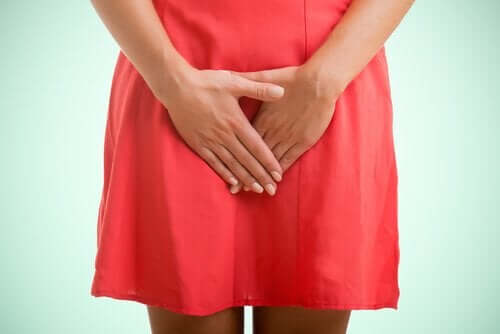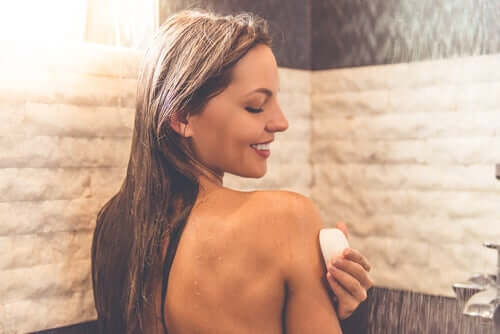Vulvar Itching: Causes and Tips to Prevent It

Vulvar itching is a clinical manifestation of a possible alteration or disease that you should talk to your doctor about.
It affects a lot of women. This is because the vulva, due to its anatomy, is very susceptible to alterations of its outermost layer.
Anatomy of the vulva
The vulva is the anatomical part of women’s bodies that covers the entrance to the vagina. It’s important not to confuse it with the vagina, since they’re different areas. It consists of the mons pubis in the upper area, which protects the pubis. This is a more or less bulky area because it has a lot of fatty tissue and is covered with hair.
The labia majora are located on the sides and also consist of fatty tissue. Inside and below the labia majora, frequently hidden by them, we have the labia minora, which are much thinner, form small folds, and protect the entrance to the vagina. In their upper part, they fuse to form the clitoral hood to protect the clitoris.
The vulva is a particular anatomical area where the urinary, genital, and gastrointestinal tract converge. In it, we find three orifices: the urinary meatus, the vaginal opening, and the anus.
Also, it’s an area that’s constantly subjected to moisture, heat, and friction. These three factors make it especially sensitive to different entities that can cause itching in this area.

How vulvar itching affects women
It’s very common for women who suffer from itching in the area to self-diagnose as a fungal infection or poor hygiene. Many times, they tend to resort to antifungal ovules or apply excessive hygiene measures. Both measures are incorrect and may even worsen the underlying problem.
Vulvar itching affects the daily life of women who suffer from it and may even affect their sex life. If you’re suffering from itching in this area, it’s advisable to go see your doctor so that they can make a correct diagnosis and indicate the right treatment, if you require it.
The causes of vulvar itching
This itching can be secondary to a topical condition, such as irritant contact, allergic, or atopic dermatitis or systemic and generalized diseases that can affect the skin of this area. In medicine, they’re divided into acute and chronic, according to the evolution:
Main causes of acute
- Contact. Allergic or irritant.
- Infectious. That may be:
- Viral
- Bacterial
- Fungal
- Parasitic
Main causes of chronic
- Dermatosis. Lichen planus pigmentous.
- Vaginal atrophy. During menopause.
- Neoplasms.
- Systemic diseases. Crohn’s disease, diabetes.
- Gastrointestinal diseases. Fissures, hemorrhoids, etc.
Thus, if the itching lasts more than 24 hours, we advise you to go see your gynecologist or midwife so they can examine and refer you, if necessary, to a dermatologist or indicate a treatment if any microorganism is the cause of the itching.
Tips to avoid vulvar itching
Below, we’re going to share some general tips to avoid vulvar itching and keep your vulva healthy:
- Wash it every day, opening the labia majora well and paying special attention to the folds. Excessive hygiene can disrupt microbiota balance, making the vulva more vulnerable to infection or injury.

- Use soaps that are adequate for this delicate area and wash your vulva with your hands. Avoid sponges or mittens, as they can damage the skin.
- The smell is normal and varies from one woman to another depending on the time of the cycle they’re in and sexual arousal. However, if you’re suffering from a persistent bad smell (which is often accompanied by itching), don’t try to hide it with wipes, feminine deodorants, or by washing yourself. Instead, go see a specialist as soon as possible.
- Full hair removal can increase vulvar itching.
- Continuous use of panty liners or pads dry out the area a lot or expose it to moisture, making it more susceptible to itching.
- Wear breathable cotton underwear.
- Leave the area panty-free for a few minutes each day to air it out.
- Avoid wearing tight pants or thong panties, as they can increase the risk of suffering from itching.
- If you’re suffering from itching, try to avoid scratching the vulva directly, as you can damage the area.
We hope that these useful tips prove helpful to you. However, if in doubt, see your specialist.
Vulvar itching is a clinical manifestation of a possible alteration or disease that you should talk to your doctor about.
It affects a lot of women. This is because the vulva, due to its anatomy, is very susceptible to alterations of its outermost layer.
Anatomy of the vulva
The vulva is the anatomical part of women’s bodies that covers the entrance to the vagina. It’s important not to confuse it with the vagina, since they’re different areas. It consists of the mons pubis in the upper area, which protects the pubis. This is a more or less bulky area because it has a lot of fatty tissue and is covered with hair.
The labia majora are located on the sides and also consist of fatty tissue. Inside and below the labia majora, frequently hidden by them, we have the labia minora, which are much thinner, form small folds, and protect the entrance to the vagina. In their upper part, they fuse to form the clitoral hood to protect the clitoris.
The vulva is a particular anatomical area where the urinary, genital, and gastrointestinal tract converge. In it, we find three orifices: the urinary meatus, the vaginal opening, and the anus.
Also, it’s an area that’s constantly subjected to moisture, heat, and friction. These three factors make it especially sensitive to different entities that can cause itching in this area.

How vulvar itching affects women
It’s very common for women who suffer from itching in the area to self-diagnose as a fungal infection or poor hygiene. Many times, they tend to resort to antifungal ovules or apply excessive hygiene measures. Both measures are incorrect and may even worsen the underlying problem.
Vulvar itching affects the daily life of women who suffer from it and may even affect their sex life. If you’re suffering from itching in this area, it’s advisable to go see your doctor so that they can make a correct diagnosis and indicate the right treatment, if you require it.
The causes of vulvar itching
This itching can be secondary to a topical condition, such as irritant contact, allergic, or atopic dermatitis or systemic and generalized diseases that can affect the skin of this area. In medicine, they’re divided into acute and chronic, according to the evolution:
Main causes of acute
- Contact. Allergic or irritant.
- Infectious. That may be:
- Viral
- Bacterial
- Fungal
- Parasitic
Main causes of chronic
- Dermatosis. Lichen planus pigmentous.
- Vaginal atrophy. During menopause.
- Neoplasms.
- Systemic diseases. Crohn’s disease, diabetes.
- Gastrointestinal diseases. Fissures, hemorrhoids, etc.
Thus, if the itching lasts more than 24 hours, we advise you to go see your gynecologist or midwife so they can examine and refer you, if necessary, to a dermatologist or indicate a treatment if any microorganism is the cause of the itching.
Tips to avoid vulvar itching
Below, we’re going to share some general tips to avoid vulvar itching and keep your vulva healthy:
- Wash it every day, opening the labia majora well and paying special attention to the folds. Excessive hygiene can disrupt microbiota balance, making the vulva more vulnerable to infection or injury.

- Use soaps that are adequate for this delicate area and wash your vulva with your hands. Avoid sponges or mittens, as they can damage the skin.
- The smell is normal and varies from one woman to another depending on the time of the cycle they’re in and sexual arousal. However, if you’re suffering from a persistent bad smell (which is often accompanied by itching), don’t try to hide it with wipes, feminine deodorants, or by washing yourself. Instead, go see a specialist as soon as possible.
- Full hair removal can increase vulvar itching.
- Continuous use of panty liners or pads dry out the area a lot or expose it to moisture, making it more susceptible to itching.
- Wear breathable cotton underwear.
- Leave the area panty-free for a few minutes each day to air it out.
- Avoid wearing tight pants or thong panties, as they can increase the risk of suffering from itching.
- If you’re suffering from itching, try to avoid scratching the vulva directly, as you can damage the area.
We hope that these useful tips prove helpful to you. However, if in doubt, see your specialist.
This text is provided for informational purposes only and does not replace consultation with a professional. If in doubt, consult your specialist.








